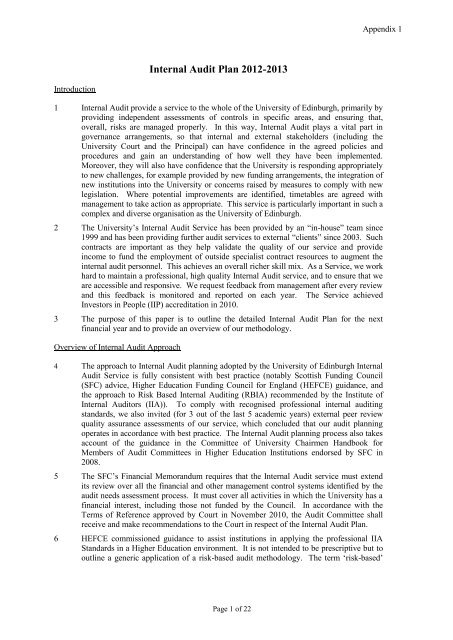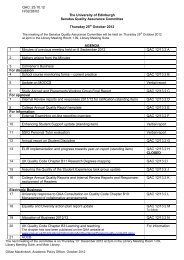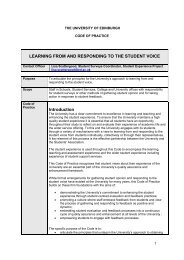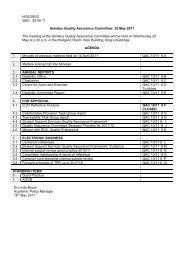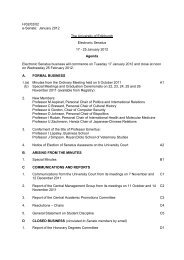Chapter 3 â Policy Implications for Gaelic - University of Edinburgh
Chapter 3 â Policy Implications for Gaelic - University of Edinburgh
Chapter 3 â Policy Implications for Gaelic - University of Edinburgh
Create successful ePaper yourself
Turn your PDF publications into a flip-book with our unique Google optimized e-Paper software.
Appendix 1<br />
Internal Audit Plan 2012-2013<br />
Introduction<br />
1 Internal Audit provide a service to the whole <strong>of</strong> the <strong>University</strong> <strong>of</strong> <strong>Edinburgh</strong>, primarily by<br />
providing independent assessments <strong>of</strong> controls in specific areas, and ensuring that,<br />
overall, risks are managed properly. In this way, Internal Audit plays a vital part in<br />
governance arrangements, so that internal and external stakeholders (including the<br />
<strong>University</strong> Court and the Principal) can have confidence in the agreed policies and<br />
procedures and gain an understanding <strong>of</strong> how well they have been implemented.<br />
Moreover, they will also have confidence that the <strong>University</strong> is responding appropriately<br />
to new challenges, <strong>for</strong> example provided by new funding arrangements, the integration <strong>of</strong><br />
new institutions into the <strong>University</strong> or concerns raised by measures to comply with new<br />
legislation. Where potential improvements are identified, timetables are agreed with<br />
management to take action as appropriate. This service is particularly important in such a<br />
complex and diverse organisation as the <strong>University</strong> <strong>of</strong> <strong>Edinburgh</strong>.<br />
2 The <strong>University</strong>’s Internal Audit Service has been provided by an “in-house” team since<br />
1999 and has been providing further audit services to external “clients” since 2003. Such<br />
contracts are important as they help validate the quality <strong>of</strong> our service and provide<br />
income to fund the employment <strong>of</strong> outside specialist contract resources to augment the<br />
internal audit personnel. This achieves an overall richer skill mix. As a Service, we work<br />
hard to maintain a pr<strong>of</strong>essional, high quality Internal Audit service, and to ensure that we<br />
are accessible and responsive. We request feedback from management after every review<br />
and this feedback is monitored and reported on each year. The Service achieved<br />
Investors in People (IIP) accreditation in 2010.<br />
3 The purpose <strong>of</strong> this paper is to outline the detailed Internal Audit Plan <strong>for</strong> the next<br />
financial year and to provide an overview <strong>of</strong> our methodology.<br />
Overview <strong>of</strong> Internal Audit Approach<br />
4 The approach to Internal Audit planning adopted by the <strong>University</strong> <strong>of</strong> <strong>Edinburgh</strong> Internal<br />
Audit Service is fully consistent with best practice (notably Scottish Funding Council<br />
(SFC) advice, Higher Education Funding Council <strong>for</strong> England (HEFCE) guidance, and<br />
the approach to Risk Based Internal Auditing (RBIA) recommended by the Institute <strong>of</strong><br />
Internal Auditors (IIA)). To comply with recognised pr<strong>of</strong>essional internal auditing<br />
standards, we also invited (<strong>for</strong> 3 out <strong>of</strong> the last 5 academic years) external peer review<br />
quality assurance assessments <strong>of</strong> our service, which concluded that our audit planning<br />
operates in accordance with best practice. The Internal Audit planning process also takes<br />
account <strong>of</strong> the guidance in the Committee <strong>of</strong> <strong>University</strong> Chairmen Handbook <strong>for</strong><br />
Members <strong>of</strong> Audit Committees in Higher Education Institutions endorsed by SFC in<br />
2008.<br />
5 The SFC’s Financial Memorandum requires that the Internal Audit service must extend<br />
its review over all the financial and other management control systems identified by the<br />
audit needs assessment process. It must cover all activities in which the <strong>University</strong> has a<br />
financial interest, including those not funded by the Council. In accordance with the<br />
Terms <strong>of</strong> Reference approved by Court in November 2010, the Audit Committee shall<br />
receive and make recommendations to the Court in respect <strong>of</strong> the Internal Audit Plan.<br />
6 HEFCE commissioned guidance to assist institutions in applying the pr<strong>of</strong>essional IIA<br />
Standards in a Higher Education environment. It is not intended to be prescriptive but to<br />
outline a generic application <strong>of</strong> a risk-based audit methodology. The term ‘risk-based’<br />
Page 1 <strong>of</strong> 22


